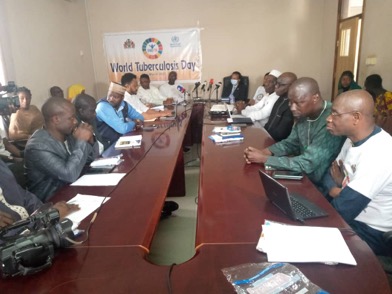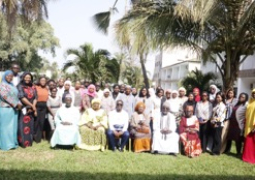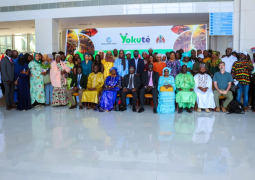
The day is also set aside to highlight the considerable progress made in the face of the global challenges as well as to inspire hope and encourage high level leadership, increase investment, faster uptake of new World Health Organization recommendations among others.
Thus, the event at the National Leprosy and Tuberculosis Control Programme Office behind MDI, was held under the theme 'Yes! We Can End TB.'
Welcoming the gathering, Wandifa Samateh, programme manager at National Leprosy and TB Control Programme, said the day provides an opportunity to remind people about the global health threat presented by TB, while also recognising the collective efforts of all countries and partners in the fight against the disease.
“Due to the low global investment in TB services, this year’s theme calls for more investment and partnership in TB care and prevention. The emergence of covid-19 pandemic has also caused serious challenges on TB services. In The Gambia, there has been a decline in TB case notification for 2020/21.”
Samateh revealed that TB case notification dropped from 2635 in 2019 to 2279 in 2021. “However, in post covid-19, we have been a case notification from 2279 cases in 2021 to 2576 cases in 2022.”
He, however, remains optimistic that with strong partnership demonstrated over the years, the country would make significant headway in the fight against tuberculosis.
For his part, Alpha Khan, acting director National Aid Secretariat (NAS), explained that another TB Day is upon us and as usual it is a day of sober reflection on national and global status of the disease.
“In this reflection, we ask ourselves where we were in the yesteryears and where we are today. Considerable progress has been made in the face of the global challenges which we continue to take on.”
Khan reminded that this year is critical with opportunities to raise visibility and political commitment, the spotlight of World TB Day will be urging countries to ramp up progress in the lead up to the 2023 UN high level meeting on TB.
"WHO will also issue call to action with partners urging member states to accelerate the roll out of the new WHO-recommended shorter all oral treatment regimen for drug resistant TB.
Whitney Wanjik Mwangi from the African Union, observed that the disease is global health threat in view of the age group that is largely affected by the disease is the core and backbone of continent.
“If young people are affected and are not able to live up to their utmost capacity to advance development and prosperity in Africa, then we are certainly doomed. And I hope this is a call to action for all of us to make sure we put our best to implement policies and strategies that we have set as a continent.”
She congratulated The Gambia for all the activities and initiatives with regards to making sure people that are well informed and strategies necessary to combat the disease.
Dr. Desta Tiruneh, representative of World Health Organization, said the day reminds people that the disease is still a global health threat, saying it causes a devastating consequence particularly for developing countries.
Despite significant achievement made in the fight against preventable diseases, the WHO rep said the disease still remains a problem and that ending TB means reducing morbidity by 90% before 2035 and mortality by 95%.
To that end, he acknowledged that they are making significant efforts, but still more is required to totally eradicate it. “TB still remains a major health problem in The Gambia even though the country has made considerable gains in TB notification cases.”
Muhammed T. Nyassi, deputy director of Health Services representing the Ministry of Health, said ‘if people direct their efforts towards one direction’ certainly we can end TB, but that is only achievable with the right mindset, leadership and committed political will.
Nyassi reminded that tuberculosis remains a disease of health importance globally and that The Gambia is no exception.
“Worldwide, TB is the 13th leading cause of death and the second leading infectious killer after Covid-19. Annually, an estimated 10 million people fall ill with TB and a total of 1.6 million people died from disease in 2021. Globally, TB incidence is falling at about 2% per year and between 2015 and 2020, the cumulative reduction was 11%.”
Nyassi also spoke about the significant strides made by The Gambia in reducing TB cases in the past year, saying in The Gambia, diagnosis and treatment of TB are provided free of charge irrespective of one’s nationality.
“And there has never been a stock out of anti TB drugs in the country. The theme of this year’s event, he said, is meant to give hope and encourage high level leadership, increased investments, faster uptake of new WHO recommendations, and adoption of innovations, accelerated action and multi-sectoral collaboration to combat TB epidemic.”
Read Other Articles In National News

Banjul North MP launches free medication program to support constituency
Feb 3, 2025, 11:58 AM




